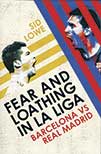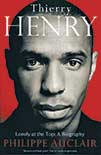Search: 'Zinedine Zidane'
Stories
Kopa, who died last week at the age of 85, also won three European Cups and six league titles during his time at Reims and Real Madrid
The country has fallen in love with their exciting national team
10 June ~ They say France has ground to a standstill, but there was little sign of that as commuters poured out of Gare Lille Flandres into the June sunshine this morning. Strikes continue to take place across the country as part of the CGT union’s widespread protests against the controversial loi travail, which would change working conditions in the country – but you would never have guessed it from the number of people wandering down Rue du Molinel into offices in the usual manner or enjoying their morning cafés on the pavement terraces.
 Barcelona vs Real Madrid
Barcelona vs Real Madrid
by Sid Lowe
Yellow Jersey, £18.99
Reviewed by Dermot Corrigan
From WSC 322 December 2013
“Barcelona good, Madrid bad” is a pretty common idea among English-speaking football fans. Even those who question the Catalan club’s “football philosophy”, or its board’s financial dealings with Qatar and Brazil, still often see Barça as purer than, and morally superior to, their rivals from the Spanish capital.
This idea can be traced all the way back to George Orwell’s Homage To Catalonia – and is just plain wrong, according to Sid Lowe’s new contribution to the growing pile of English language books on Spanish football.
Fear And Loathing In La Liga: Barcelona vs Real Madrid takes a broader approach than most, looking closely at the impact of political and cultural trends on the game, including epigraphs from writer Antonio Machado and Swansea City attacker Michu. The early 20th century poet’s quote is of “the two Spains”, a famous line referring to the pre-Civil War right-left political divide. But Lowe appears to agree more with the modern player’s preference to avoid choosing one or the other.
The strongest chapters consider the effect of the 1936-39 conflict on football and turn over some pretty widely held preconceptions. Madrid (the city) was not Franco’s base, instead it suffered the fiercest nationalist attacks. This meant Real Madrid had to stop playing official games, their ground was ruined, and their republican club president Rafael Sánchez Guerra was imprisoned when the city finally fell to Franco’s forces. Barcelona was less directly impacted by the fighting, so FC Barcelona kept playing in the Catalan Championship and Mediterranean League, then toured North America.
During the first 15 years of the dictatorship the Catalan club were also more successful, winning five La Liga titles to Real Madrid’s none. In those years the Barça boardroom was stuffed with well-connected businessmen, just as it is now. Professional football clubs – in Spain under Franco, just as in England under Tony Blair – tend to go with the political flow. Which explains Barcelona’s current embrace of Catalan nationalism.
Lowe’s impressive list of interviewees includes Alfredo di Stéfano, Johan Cruyff, Luís Figo, Zinedine Zidane and Andrés Iniesta. He uncovers new archival evidence about how Barça president Josep Sunyol died in 1936, and why Di Stéfano joined Madrid not Barça in 1953. There are also neat mentions of Barça’s (unwitting) role in the murder of Leon Trotsky, as well as Madrid’s links to the Beatles in the 1960s and Pedro Almodovar in the 1980s. It’s a rare book that discusses ETA (the Basque separatist organisation) and Michael Owen on the same page.
The weakest section is towards the end, as by now there is little new to say on José Mourinho the ex-translator versus Josep Guardiola the former ballboy. But that’s a minor quibble. We have already seen how closely Spain’s two biggest clubs have mirrored each other through the years. Real Madrid and Barcelona do not represent different strands in Spanish history, or competing political points of view, they’re just two sides of the same coin.
 Lonely at the top:
A biography
Lonely at the top:
A biography
by Philippe Auclair
Macmillan, £17.99
Reviewed by David Stubbs
From WSC 310 December 2012
“I don’t recognise myself in the players I see today,” George Best said in his very last interview, conducted, as it happens, with Philippe Auclair himself. “There’s only one who excites me, and that is Thierry Henry. He’s not just a great footballer, he’s a showman, an entertainer.”
Henry, however, is not exactly in the Best tradition. He has both more and less about him than the ultimately ruined Manchester United superstar. Henry’s sheer quantity, as well as quality, of achievements at both league and international level dwarf Best’s but for all that he hasn’t quite blazed in the firmament in the same way. A lifelong teetotaller, he yields little or nothing in the way of a volatile private life, while his personality ranges from affable to aloof. For all those va-va-voom ads, he is simply not as scintillating a character off the field as he was on it in his prime. Maybe that’s why there has only been one full-length study of the player published in the UK – Oliver Derbyshire’s Thierry Henry: The amazing life of the greatest footballer on earth – a book as abysmal as its title, almost Piers Morganesque in the low it sets in Arsenal-related discourse.
Auclair admits not being drawn to Henry the way he was to Eric Cantona, his pre- vious subject in the acclaimed The Man Who Would Be King. However, Lonely At The Top is probably about as shrewd and in-depth a profile as we’re likely to get of Henry, who seems to have been moulded by the drive of his father, a highly influential figure in his life until he made a botched attempt to effect a transfer for his son to Real Madrid. The book tracks his development from a speedy but slight youngster reluctant to track back to the machine of panache he was at Arsenal. Auclair adds his own flourish with allusions to the likes of Philip Larkin and Gustave Flaubert which will raise the blood temperature of the compiler of Pseuds Corner but otherwise will only distract the most determinedly Philistine reader.
Auclair poses questions he’s not always able to answer, such as why Henry never seemed to get along with Zinedine Zidane and truly fulfil his potential at international level, or why Arsène Wenger is so beset at times with tactical ineptitude despite his success at Arsenal. Viewing matters from a French perspective, he regards Henry’s fateful handball against the Republic of Ireland as an unfortunate crowning moment in his career given the probably unfair antipathy it triggered against him, though Arsenal fans in particular would hardly see this as quite so defining of the player.
The access he has had, some forbidden to UK journalists, does yield insightful, incidental nuggets along the way: into the character of Emmanuel Petit, for instance, profoundly affected by a personal tragedy; Patrick Vieira’s excessively informative quote that the cheers of the Highbury throng gave him “a hard on”; as well as the partying habits of the French squad in the 2002 World Cup. This occasionally gives the impression that, fine and thoughtful as Lonely At The Top is, its author would secretly prefer to be writing about somebody or something else.